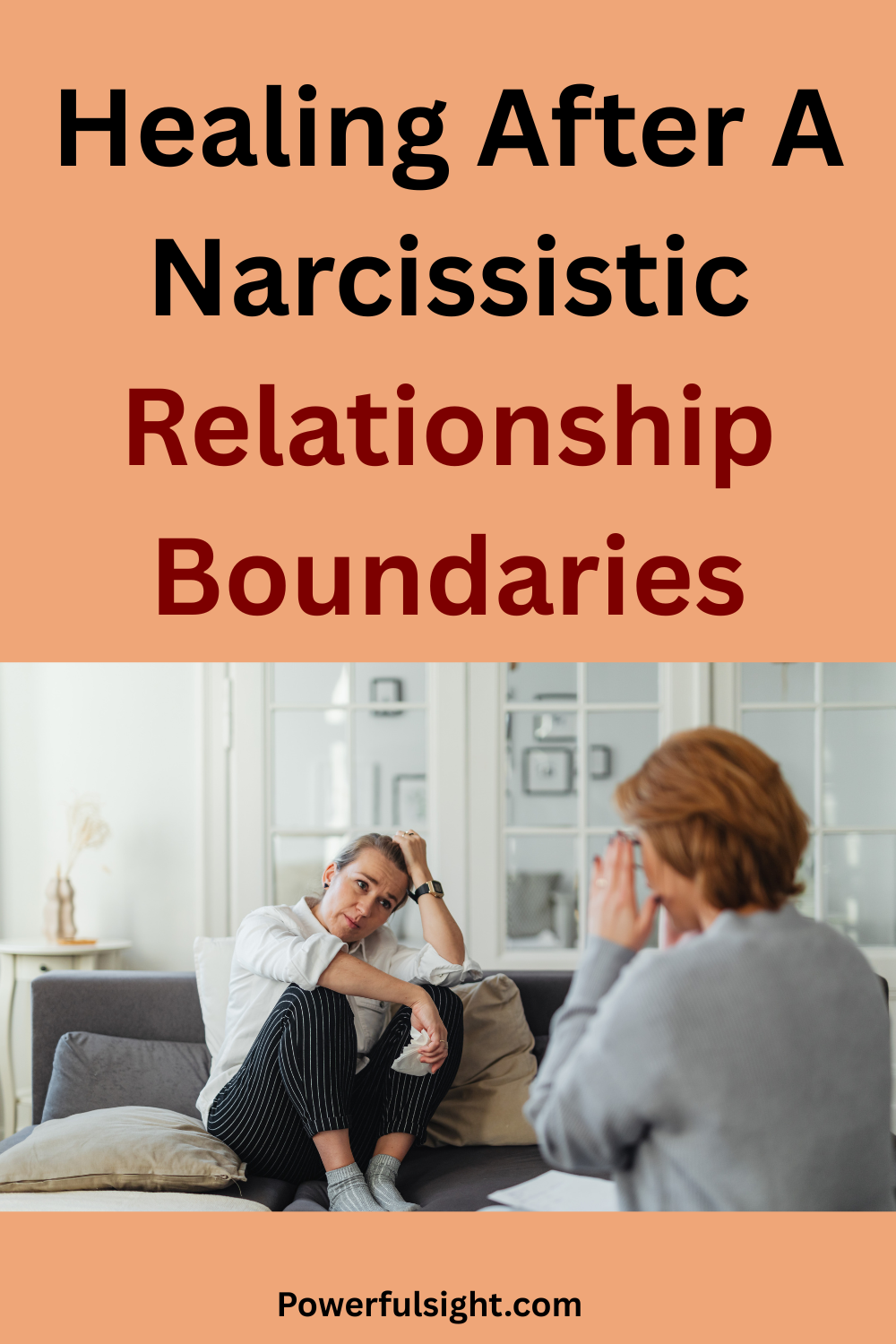I know what you’re thinking: You don’t know me. You don’t know what I’ve been through. There are no words in any language to describe the hell I survived with her.
So let me tell you what I know. I know you. I’ve been in your shoes. I’ve been through the abyss. I know what it feels like to live on autopilot, to have nightmares in broad daylight, to lose yourself and your power in someone else’s reflection.
But here’s the thing: there is a way back to you—a way to feel safe again, a way to set boundaries. It’s time to heal.

Healing After a Narcissistic Relationship Boundaries
A narcissistic relationship is not like any other. It’s not just a bad breakup or a healthy relationship that ended. Narcissistic abuse is a process—one that slowly chips away at your sense of self and your understanding of reality.
A narcissist’s modus operandi is control. They often gaslight their partners, use them as doormats, or manipulate them through guilt, threats, or charm. The most dangerous phase of the relationship is usually the devaluation phase—when the abuser is done idealizing the survivor. During this stage, your partner can say or do anything to keep you trapped in the relationship.
There’s a term in psychology called traumatic bonding or Stockholm Syndrome. It describes what happens when victims develop a psychological attachment to their abusers after enduring traumatic experiences together. That’s how powerful this manipulation is. You may think you’re falling in love when, in reality, you’re falling into a trap.
The truth is that narcissists are a global epidemic, and you are not alone. If you feel like you’ve been through something unspeakable—if you find it hard to trust people or even yourself—you need to know that healing is possible.
Related: 100 Questions To Ask Your Pastor About Relationships
How to heal After a Narcissistic Relationship Boundaries
Step One: Accept What Happened
The first step to healing from narcissistic abuse is acceptance. Acceptance doesn’t mean that you are okay with what happened or that you must forgive your abuser (although, eventually, that might come). It means that you’re no longer in denial.
Too many survivors of narcissistic relationships spend months or years wondering: Was it really that bad? Did I blow things out of proportion? Was I unreasonable? This self-doubt is normal. Narcissists create it through manipulation, gaslighting, and emotional withholding.
To heal, you must acknowledge that you were in an unhealthy, even toxic, relationship. Write down what happened. Talk to a trusted friend or a therapist. The goal is not to dwell on the pain but to face it honestly.
Related: 6 Tips For Setting Healthy Boundaries In A Relationship
Step Two: Go No Contact (If You Can)
One of the most effective healing methods is to cut off contact with your abuser. But not only with them—you should also distance yourself from mutual friends, family members, or places that remind you of them.
This doesn’t mean you can’t be civil if you must communicate (for instance, exes who share custody of children). It means you must establish firm, healthy boundaries.
If possible, block your abuser on all platforms—phone, social media, and email. Resist the urge to “stay friends” or explain yourself. Remember, the narcissist trained you to feel guilty for putting yourself first. No contact is not revenge—it’s recovery. It ends the psychological torment that started with them.
Related: What Does Hyper Sexualization Of Women Mean In Relationships?
Step Three: Rebuild Your Boundaries
Boundaries are not walls. They are healthy lines that protect you physically and emotionally. After a narcissistic relationship, setting boundaries can feel unfamiliar or even frightening.
You might be afraid to say no for fear of disappointing or losing someone. You might feel guilty for prioritizing your needs.
The key is to start small. Practice saying no. Notice when you’re being manipulated or guilt-tripped. Write down what behaviors you will no longer tolerate. Hold yourself accountable, even when it feels uncomfortable.
Remember: your peace is more important than anyone’s agenda.
Related: 12 Daily Habits To Stay Happy In A Relationship
Step Four: Heal the Inner Voice
One of the most insidious effects of narcissistic abuse is how it distorts your inner voice. You might find yourself saying, I’m not good enough. I don’t deserve love. I’m so stupid.
That inner critic is not your voice—it’s the residue of the abuser’s words. To heal, you must replace it with compassion.
When you hear that harsh voice, pause and ask, Whose voice is this? When you recognize that it isn’t your own, you can begin to replace it with something gentler.
For example:
Instead of I’m stupid, say I made a mistake.
Instead of I don’t deserve love, say I deserve love, but this person wasn’t capable of giving it.
Each time you correct that inner dialogue, you take one step away from the abuser and one step closer to your true self.
Related: Major Qualities of an Ideal Relationship
Step Five: Rediscover Who You Are
Narcissistic relationships revolve entirely around the narcissist. You may have given up hobbies, friendships, and independence—often out of fear of conflict or abandonment. Now it’s time to reclaim them.
Return to what once made you happy. Reconnect with safe, supportive people. Don’t feel guilty for putting yourself first. Rediscovering who you are is not selfish; it’s survival.
Related: 15 Signs A Narcissist Is Losing Control Over You
Step Six: Don’t Rush Forgiveness
Forgiveness is complicated. It can be freeing, but it can also be dangerous if forced. Some survivors use forgiveness prematurely to avoid their pain.
Start by offering yourself grace. You don’t have to let anyone back into your life. You don’t have to pretend that everything is fine. Healing takes time, and genuine forgiveness—if you choose it—will come naturally when you’re ready.
Step Seven: Seek Professional Help
If possible, seek help from a therapist or counselor who specializes in narcissistic abuse. Recovery is challenging, and professional support can make a tremendous difference.
If therapy isn’t an option, look for support groups or online communities for survivors. Sharing your story with others who understand can be deeply healing. Just be cautious and discerning with whom you open up—trust should be earned, not assumed.
Related: 7 Tactics Narcissists Use To Keep You Small
Step Eight: Learn to Trust Again
After narcissistic abuse, trusting again can feel impossible. You may question everyone’s motives or expect manipulation at every turn. That’s natural.
Rebuild trust gradually, starting with yourself. Listen to your instincts. When something feels wrong, believe it. When something feels peaceful, allow it.
As you meet new people, take your time. Ask yourself: Do they respect my boundaries? Do I feel safe with them? Healthy relationships are calm, consistent, and mutual—not chaotic or draining.
Step Nine: Protect Your Energy
You’ve met the kind of people who drain your energy—those who gossip, manipulate, or make you feel small. After narcissistic abuse, your sensitivity to such people becomes sharper. Use that awareness as protection.
You don’t have to attend every argument or conversation that invites you. You don’t owe anyone access to your peace. Saying no is self-respect, not cruelty.
Your energy is sacred. Protect it like your life depends on it, because emotionally, it does.
Step Ten: Believe That Healing Is Possible
Healing may feel overwhelming at times, but it gets easier. As you continue on your journey, you’ll notice the pain softening. You’ll laugh again. You’ll make decisions without fear.
One day, you’ll wake up and realize that you’re free. You’re no longer living in their shadow—you’re standing in your own light. That’s the moment you’ll know you’ve healed.
Final Thoughts
If there’s one lesson that healing from a narcissistic relationship teaches, it’s that boundaries are everything. They are not selfish. They are your safeguard, your declaration of self-respect, and your guide back to peace.
Boundaries are how you set yourself free. They remind you—and the world—that you matter.
You are not broken. You were manipulated, yes—but you survived. And survival is proof of your strength.
You will love again. Not the way you once did, but with greater wisdom, discernment, and self-respect. And when you do, your boundaries will protect the peace you’ve fought so hard to rebuild.
Save pin for later.

- 10 Signs Your Partner Genuinely Respects You - 06/12/2025
- 15 Things That Destroy Relationship Slowly - 06/12/2025
- How to Know If You’re Being Love Bombed - 06/12/2025